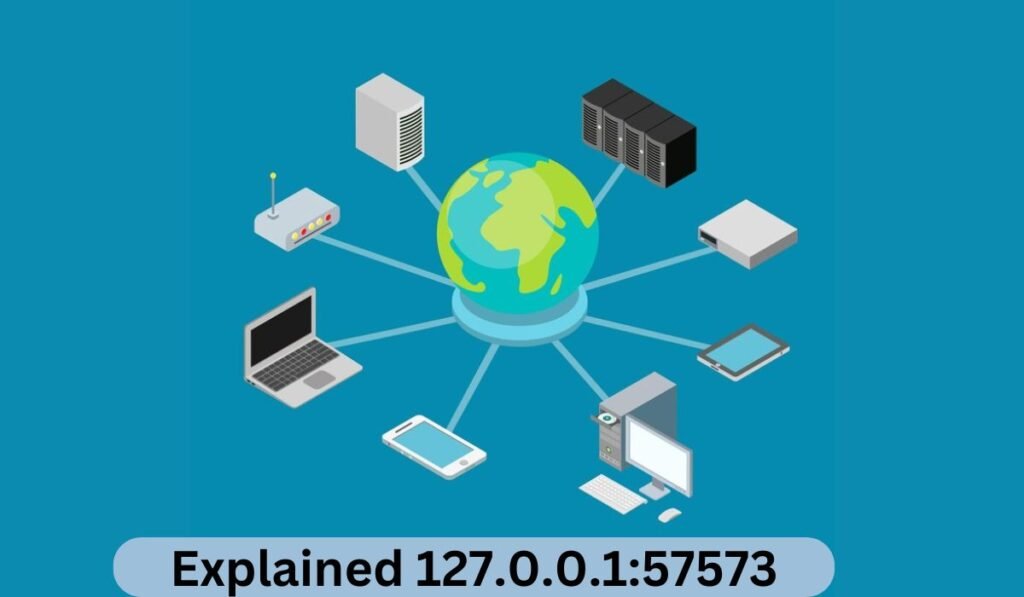Introduction to 127.0.0.1 and Localhost
Hello Readers! When working in the world of networking or web development, you often encounter the IP address 127.0.0.1. This IP address is universally recognized as localhost, essentially a loopback address that lets your computer communicate with itself. But why is it used, and what role does the specific port 57573 play? In this article, we’ll explore the technical aspects of 127.0.0.1:57573, its common use cases, and how you can troubleshoot and optimize your local environment when working with ports.
Understanding 127.0.0.1:57573 IP Addresses
Before diving into the specifics, it’s important to understand what an IP address is. 127.0.0.1:57573 IP addresses are unique strings of numbers that identify devices on a network, like how postal addresses identify homes. They are essential for enabling communication between devices over the internet or local networks.
There are two main categories of IP addresses:
- Public IP Addresses: Visible on the internet, used to identify devices globally.
- Private IP Addresses: Used within local networks, hidden from the internet.
The 127.0.0.1 IP address is a private loopback address. It tells your computer to communicate with itself rather than reaching out to other devices.
The Role of Ports in Networking
An IP address is just one part of the networking puzzle. The other crucial element is the port number. Ports are like doors that allow network traffic to enter and leave a computer. Each service or application running on your machine uses a different port, ensuring that traffic is routed correctly.
In the address 127.0.0.1:57573, the port 57573 is assigned to a specific application running on the localhost. This port could be used for local testing of web apps, database connections, or other services.
Comparison: 127.0.0.1 vs. Other IP Addresses
127.0.0.1 is unique in its role. It’s different from IP addresses like 0.0.0.0, which represent all IP addresses available on a machine, or external IPs like 192.168.x.x that represent devices on your local network. While 127.0.0.1 is for local communication only, other addresses like 192.168.x.x or public IP addresses are used to communicate with external devices or networks.
Benefits of Using 127.0.0.1 for Development
There are several reasons why developers use 127.0.0.1 during development:
- Isolation: You can run apps on your local machine without exposing them to the internet.
- Security: Localhost isn’t accessible from the web, so it provides a safer environment for testing.
- Convenience: You can develop and test applications locally before deploying them to a live server.
Common Ports and Their Uses
Developers often need to specify a port when running multiple services on 127.0.0.1. Common ports include:
- 80 for HTTP traffic
- 443 for HTTPS traffic
- 3306 for MySQL databases
The port 57573 can be randomly chosen by a developer or automatically assigned by a system for testing purposes.
Setting Up 127.0.0.1:57573 in Different Environments
Using 127.0.0.1 in Windows
In Windows, you can configure your development environment to bind a service to 127.0.0.1:57573 using tools like XAMPP or WAMP for running local servers.
Setting Up Localhost on macOS
Mac users can set up localhost via the built-in Apache server or tools like MAMP, assigning services to ports like 57573.
Local Development on Linux with 127.0.0.1
Linux users can configure services like Apache or Nginx to bind to 127.0.0.1 and custom ports for local testing.
Troubleshooting Common Issues with 127.0.0.1:57573
Cannot Connect to Localhost: Common Causes
One of the most common issues is the inability to connect to localhost. This could be due to firewall settings, incorrect service configuration, or a service not running properly.
Port Conflicts and How to Resolve Them
If multiple services try to use the same port, you’ll experience a port conflict. To fix this, assign a unique port to each service.
Firewall and Security Settings Blocking 127.0.0.1
Sometimes, firewall settings can prevent connections to 127.0.0.1. Ensure that your firewall is configured to allow local traffic on port 57573.
Security Concerns When Using Localhost
Though 127.0.0.1 is generally safe, it’s not immune to attacks, especially if misconfigured. Always secure your local environment with tools like firewalls, and ensure that external devices can’t access it unless needed.
127.0.0.1 in Web Development
Developers commonly use 127.0.0.1 to run local web servers for testing applications. This helps simulate how an app will behave in a production environment before going live.
Advanced Uses of 127.0.0.1 for Developers
Advanced users can set up virtual hosts, allowing multiple projects to run on different ports of 127.0.0.1. Tools like Docker also enable containerized services to run on localhost, using specific ports.
Conclusion
In summary, 127.0.0.1:57573 is a vital part of local development, offering a safe and isolated environment to test apps. By understanding how to use and troubleshoot this setup, you can ensure a smooth development process.
FAQs
Why Can’t I Access 127.0.0.1:57573?
You might be experiencing firewall issues, port conflicts, or the service may not be running on that port.
Is It Safe to Use 127.0.0.1 for Production?
No, 127.0.0.1 is meant for local development only. Always use external IPs for production.
How Can I Free Up Port 57573?
You can free the port by stopping any services using it or reassigning the service to a different port.
Can I Change 127.0.0.1 to a Different IP Address?
For local development, 127.0.0.1 is standard. However, you can bind your services to a different IP if needed.
Why Is 127.0.0.1 Used for Testing and Not 192.168.0.1?
127.0.0.1 is a loopback address, ensuring local-only traffic, while 192.168.x.x is for local network communication with external devices.


